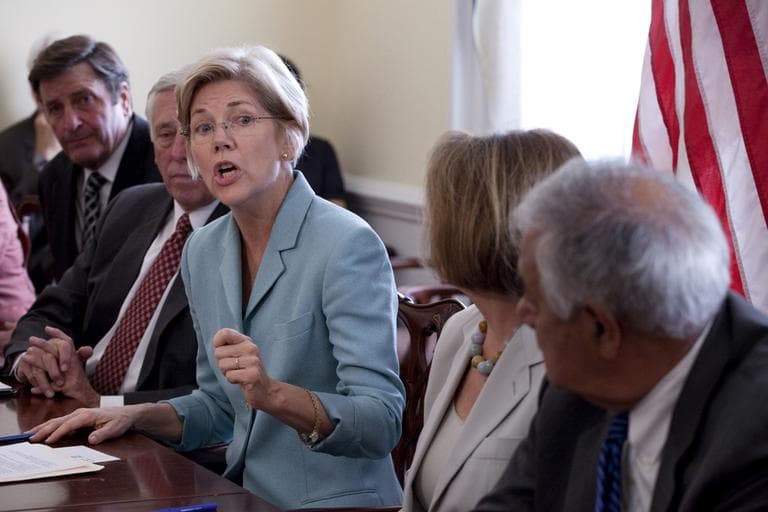Advertisement
Warren's Winding Path Leads To A Senate Run

The field of Democratic candidates hoping to unseat incumbent Republican Sen. Scott Brown is set to add a new name. After months of speculation, Harvard Law professor Elizabeth Warren announced Wednesday that she is jumping into the race.
Described by some as “the scourge of Wall Street,” Warren has gained national prominence: first, as the lead watchdog of the bank bailout, and later, as the architect of the first-ever Consumer Financial Protection Bureau.
But after doing battle in the Washington beltway, Warren is back in Massachusetts gearing up for a very different fight.
'She Came Up The Hard Way'
At a Labor Day breakfast in Boston, Warren took the stage sounding every bit like a candidate.
"Whether I fight as an outsider or I fight from the floor of the Senate, I will continue to stand up for what I believe in," Warren said to a cheering crowd.
What she believes in, Warren says, comes straight from her own upbringing.
She was born in Norman, Okla., — the youngest child in a family struggling to bounce back from the Great Depression.
While speaking at the University of California-Berkeley in 2007, Warren said her family never forgot its struggles.
"They talked about it," Warren said. "Those were the stories that permeated my childhood."
Elizabeth Warren has her admirers. In part, that’s because of how fiercely she fights for her causes. However, that fight has also made her a polarizing force.
Her family knew what it was like to have almost nothing and what it was like to struggle in tough economic times.
"What it was like to have seven years of drought, what it was like when nobody had any money, what it was like when all your neighbors left to go to California or someplace where they thought there might be jobs," Warren said.
At 16, Warren graduated from Northwest Classen High School in Oklahoma City, where she’d been a debate champion. Classmate and fellow debater Joe Baumhaft says Warren stood out.
"I got to observe her devoted passion to an idea," Baumhaft said. "If she really believed in it, she went the extra mile for it."
In the years that followed, Warren's life took turn after turn. She got married, finished college and had her first child — all while bouncing from state to state. She earned a law degree from Rutgers in New Jersey, then moved on to Texas, Michigan, Pennsylvania, and eventually, Massachusetts and Harvard Law School.
Advertisement
At every stop Warren delved deeper into the world of bankruptcy law and its effects on middle-class Americans.
"She came up the hard way," said Adam Levitin, a former student of Warren's at Harvard and now a law professor at Georgetown. "She has a very unusual pedigree for someone teaching at Harvard Law School. She went to a perfectly fine law school, but it's not a fancy law school — that should tell you something."
In the classroom, Levitin recalls, Warren had a certain style.
"[She is] a Socratic machine gun, because the questions come fast and furious," Levitin said. "Even in a class of, let's say, 80 students, she manages to call on every student."
A Controversial Figure
Clearly, Warren has her admirers. In part, that's because of how fiercely she fights for her causes. However, that fight has also made her a polarizing force.
Warren's sharp rebukes of the banking industry have attracted criticism and her tough talk on the bailout and financial regulatory reform has complicated her relationships with some lawmakers and even the White House.
Back here in Massachusetts, her work in Washington has prompted pushback from some corners, including the state Republican Party.
"If the Massachusetts Democratic primary were decided by Washington insiders and policy wonks in ivory towers, I think professor Warren would likely be the front-runner," state GOP spokesman Tim Buckley said. "But let's not forget that she's got a pretty long and pretty expensive and pretty divisive primary ahead of her."
While Warren's base of support among Democrats is expanding, the party nomination is hardly a slam dunk. For starters, there's the criticism that she’s an Ivy League elitist. Harvard Law professor Laurence Tribe, a longtime friend and colleague of Warren's, says that could handicap her in the primary race.
"A weakness — and I hate to say this as a Harvard professor — is that she's a Harvard professor," Tribe said. "That's not the first thing many people in Massachusetts want to see. They'll need to be persuaded that she's not part of any ivory tower."
Name recognition is another challenge. Warren is not well-known statewide, according to Joan Vennochi, a columnist for The Boston Globe.
"One thing that Scott Brown, the Republican senator, has right now is very high name recognition," Vennochi said. "People know who he is. Any Democrat who wins the nomination is going to be going up against all that celebrity buzz and pizzazz that he has generated over the last two years."
Warren's decision to join the race has certainly created a buzz of its own. But now she faces a long primary race and that will test whether she can translate her high-powered resume into a voter-friendly platform.
Earlier:
This program aired on September 14, 2011.